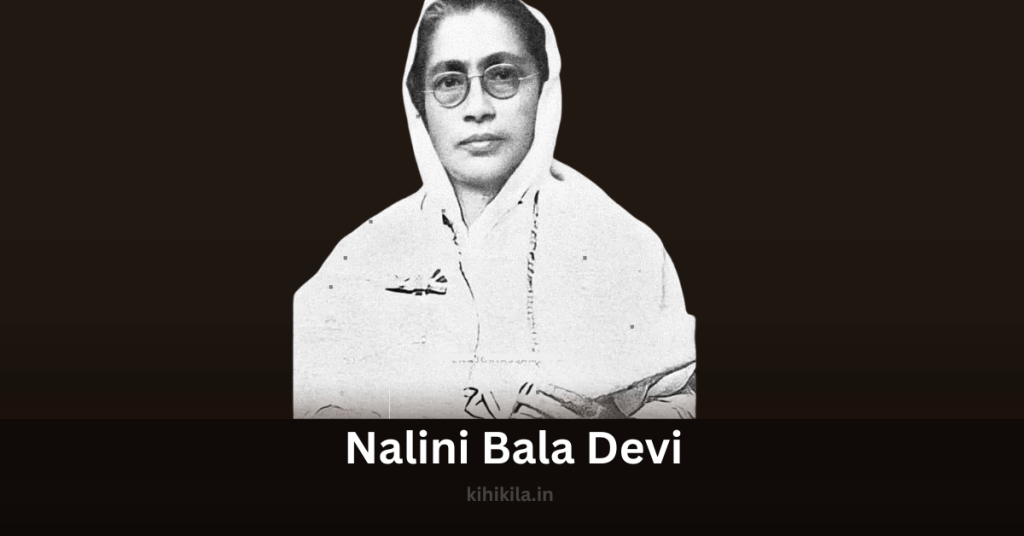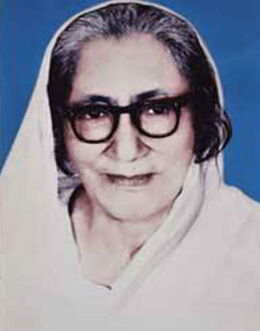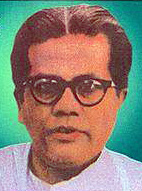Early Life and Family Background:
Nalini Bala Devi was born in 1898 in Guwahati, Assam, into a family deeply rooted in India’s freedom struggle and literature. She was the daughter of Karmaveer Nabin Chandra Bordoloi, a renowned freedom fighter and writer who strongly believed in women’s education. His influence played a key role in shaping her literary journey.
A Born Poet: First Poem at the Age of 10
At just 10 years old, she penned her first poem, Pita (Father). Recognizing her talent, her father ensured she received a quality education in Calcutta, where she was encouraged to read and expand her literary knowledge.
Tragic Life Events That Shaped Her Poetry
Despite her early success in poetry, her personal life was marked by unimaginable hardships:
- Married at 12 years old, she became a widow at 20.
- Lost two of her children at a young age.
- In 1922, while her father was imprisoned for his role in the freedom movement, her five-year-old son died in a fire.
- In 1935, she lost both her father and another son, Pabitra.
These profound tragedies, however, did not break her spirit. Instead, she channeled her emotions into poetry, making patriotism, spirituality, and devotion the central themes of her work.
Major Literary Contributions and Achievements

She was a prolific writer whose works continue to influence Assamese Literature. Some of her most celebrated contributions include:
Notable Poetry Collections:
- Sandhiyar Sur (Evening Melody) (1928) – Later included in the syllabus of Calcutta University (1946) and Guwahati University (1951).
- Alakananda (1968) – Won the Sahitya Akademi Award.
- Sopunar Sur (Melody of Dreams)
- Porosh Moni
- Yuga Devata (Hero of the Age)
- Shesh Puja (The Last Worship)
- Sheshor Sur (The Last Melody)
Biographies and Autobiographical Works:
- Smritir Tirtha – Biography of her father, Karmaveer Nabin Chandra Bordoloi.
- Biswadeepa – A collection of biographies of inspirational women.
- Eri Oha Dinbur (The Days Passed) – Her autobiography.
- Sardar Vallabhbhai Patel – A biography of the Iron Man of India.
Children’s Literature and Drama:
She made significant contributions to Assamese children’s literature and wrote:
- Meerabai – A drama.
- Prahlad – A children’s play.
- Parijotor Abhishek – A historical drama.
A Social Reformer: Founder of Moina Parijat
In 1950, she established Sadou Asom Parijat Kanan, which later became famous as Moina Parijat, a children’s organization in Assam dedicated to fostering literary and cultural development.
Awards and Recognitions
- Padma Shri (1957) – Conferred by the Government of India for her literary excellence.
- Sahitya Akademi Award (1968) – For her poetry collection Alakananda.
- President of Assam Sahitya Sabha (1955) – She presided over the 23rd Jorhat session.
Legacy and Influence
She passed away on December 24, 1977, but her literary legacy lives on. Her contribution to Assamese poetry is honored through institutions like Cotton College, Guwahati, which named its girls’ hostel as Padmashree Nalini Bala Devi Girls’ Hostel in 1986.
Conclusion
Nalini Bala Devi was more than just a poet—she was a symbol of resilience, patriotism, and literary excellence. Her ability to transform personal sorrow into timeless poetry makes her one of the most revered figures in Assamese literature. Even today, her works continue to inspire new generations of poets and writers.
FAQ’S:
Q 1. Who was Nalini Bala Devi?
Nalini Bala Devi was a prominent Assamese poet and writer, born in 1898 in Guwahati, Assam. She made significant contributions to Assamese literature and was known for her poems that focused on patriotism, spirituality, and devotion.
Q 2. What inspired Nalini Bala Devi’s poetry?
Nalini Bala Devi’s poetry was deeply inspired by her personal life experiences, including the tragic losses she faced, such as the death of her children and her father. These hardships, combined with her love for literature, drove her to write poems that reflected her emotions and devotion to her country.
Q 3. At what age did Nalini Bala Devi start writing poetry?
Nalini Bala Devi began writing poetry at the age of 10. Her first poem, titled Pita (Father), showcased her early poetic talent.
Q 4. What are some of Nalini Bala Devi’s notable works?
Some of her notable works include poetry collections like Sandhiyar Sur, Alakananda, Sopunar Sur, Shesh Puja, and autobiographical works like Eri Oha Dinbur and Smritir Tirtha. She also wrote children’s literature and plays.
Q 5. Did Nalini Bala Devi face any personal tragedies?
Yes, Nalini Bala Devi faced several personal tragedies. She became a widow at 20, lost two children at a young age, and faced the sorrow of losing her father and another son during different periods in her life.
Q 6. What major awards did Nalini Bala Devi receive for her work?
Nalini Bala Devi was awarded the Padma Shri in 1957 for her literary achievements. She also received the Sahitya Akademi Award in 1968 for her poetry collection Alakananda.
Q 7. What was Nalini Bala Devi’s contribution to children’s literature?
Nalini Bala Devi made significant contributions to Assamese children’s literature. She wrote plays such as Meerabai and Prahlad, as well as historical dramas like Parijotor Abhishek.
Q 8. What is Moina Parijat, and how is it related to Nalini Bala Devi?
Moina Parijat was a children’s organization founded by Nalini Bala Devi in 1950. It focused on fostering literary and cultural development for children in Assam. The organization became well-known in the state.
Q 9. How did Nalini Bala Devi contribute to social reform?
In addition to her literary work, Nalini Bala Devi was involved in social reforms. She was the founder of Moina Parijat, a children’s organization that played a key role in promoting education and culture.
Q 10. What is Nalini Bala Devi’s legacy in Assamese literature?
Nalini Bala Devi’s legacy lives on through her impactful poetry, biographies, and children’s literature. Her works continue to inspire new generations of writers and poets, and institutions like Cotton College have honored her contributions by naming their girls’ hostel after her.












